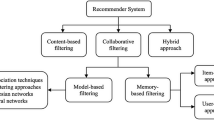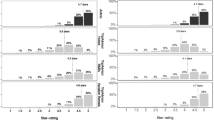Abstract
A reputation system assists people selecting whom to trust, encourages trustworthy action, and discourages participation of unskilled or dishonest. The “all good reputation” problem is common in current reputation systems, especially in e-commerce domain, making it difficult for buyers to choose credible sellers. Observing high growth of online data in Hindi language, in this paper, we propose a reputation system in this language. The functions of this system include (1) review mining for different criteria of online transactions, (2) calculation of reputation rating using Bayesian method, (3) calculation of reputation weight using typed dependency relation representation and Latent Dirichlet Allocation topic modeling technique for each criteria from user reviews, and (4) ranking sellers based on computed reputation score. Extensive simulations conducted on eBay dataset and TripAdvisor dataset show its effectiveness in solving “all good reputation” problem. So far, as our knowledge is concerned, this is the first work in Hindi language on reputation system.


Similar content being viewed by others
Notes
References
D.M. Blei, A.Y. Ng, M.I. Jordan, Latent dirichlet allocation. J. Mach. Learn. Res. 3, 993–1022 (2003)
J. Blitzer, M. Dredze, F. Pereira, Biographies, bollywood, boom-boxes and blenders: domain adaptation for sentiment classification, in Proceedings of the 45th Annual Meeting of the Association of Computational Linguistics, (2007), pp. 440–447
E. Cambria, B. Schuller, Y. Xia, C. Havasi, New avenues in opinion mining and sentiment analysis. IEEE Intell. Syst. 28(2), 15–21 (2013)
N. Chen, J. Lin, S.C. Hoi, X. Xiao, B. Zhang, Ar-miner: mining informative reviews for developers from mobile app marketplace, in Proceedings of the 36th International Conference on Software Engineering (ACM, 2014), pp. 767–778
D. Coetzee, A. Fox, M.A. Hearst, B. Hartmann, Should your mooc forum use a reputation system? in Proceedings of the 17th ACM Conference on Computer Supported Cooperative Work & Social Computing (ACM, 2014), pp. 1176–1187
A. Das, S. Bandyopadhyay, Sentiwordnet for Indian languages. Asian Federation for Natural Language Processing, China, pp. 56–63 (2010)
M.C. De Marneffe, B. MacCartney, C.D. Manning, et al., Generating typed dependency parses from phrase structure parses, in Proceedings of LREC, Vol. 6, (2006), pp. 449–454
M.C. De Marneffe, C.D. Manning, The stanford typed dependencies representation, in Coling 2008: Proceedings of the Workshop on Cross-Framework and Cross-Domain Parser Evaluation (Association for Computational Linguistics, 2008), pp. 1–8
E. Ert, A. Fleischer, N. Magen, Trust and reputation in the sharing economy: the role of personal photos in airbnb. Tour. Manage. 55, 62–73 (2016)
M. Gamon, Sentiment classification on customer feedback data: noisy data, large feature vectors, and the role of linguistic analysis, in Proceedings of the 20th International Conference on Computational Linguistics (Association for Computational Linguistics, 2004), p. 841
T.L. Griffiths, M. Steyvers, Finding scientific topics. Proc. Natl. Acad. Sci. 101(suppl 1), 5228–5235 (2004)
G. Heinrich, Parameter Estimation for Text Analysis. University of Leipzig, Tech. Rep (2008)
R. Herbrich, T. Graepel, D. Shaw, Reputation system. US Patent 8,374,973 (2013)
Y. Hijikata, H. Ohno, Y. Kusumura, S. Nishida, Social summarization of text feedback for online auctions and interactive presentation of the summary. Knowl.-Based Syst. 20(6), 527–541 (2007)
M. Hu, B. Liu, Mining and summarizing customer reviews, in Proceedings of the Tenth ACM SIGKDD International Conference on Knowledge Discovery and Data Mining (ACM, 2004), pp. 168–177
V. Jha, N. Manjunath, P. Deepa Shenoy, K.R. Venugopal, Hsas: Hindi subjectivity analysis system, in 2015 Annual IEEE India Conference (INDICON) (IEEE, 2015), pp. 1–6
V. Jha, N. Manjunath, P. Deepa Shenoy, K.R. Venugopal, Hsra: Hindi stopword removal algorithm, in International Conference on Microelectronics, Computing and Communications (MicroCom), 2016 (IEEE, 2016), pp. 1–5
V. Jha, N. Manjunath, P. Deepa Shenoy, K.R. Venugopal, Sentiment analysis in a resource scarce language: Hindi. International Journal of Scientific and Engineering Research. 7(9), 968–980 (2016)
V. Jha, N. Manjunath, P. Deepa Shenoy, K.R. Venugopal, L.M. Patnaik, Homs: Hindi opinion mining system, in IEEE 2nd International Conference on Recent Trends in Information Systems (ReTIS), 2015 (IEEE, 2015), pp. 366–371
V. Jha, R. Savitha, P. Deepa Shenoy, K.R. Venugopal, Reputation system: Evaluating reputation among all good sellers, in Proceedings of NAACL-HLT, (2016), pp. 115–121
V. Jha, R. Savitha, S.S. Hebbar, P. Deepa Shenoy, K.R. Venugopal, Hmdsad: Hindi multi-domain sentiment aware dictionary, in 2015 International Conference on Computing and Network Communications (CoCoNet) (IEEE, 2015), pp. 241–247
V. Jha, G.R. Shreedevi, P. Deepa Shenoy, K.R. Venugopal, Generating multilingual subjectivity resources using english language. Int. J. Comput. Appl. 152(9), 41–47 (2016). doi:10.5120/ijca2016911946. http://www.ijcaonline.org/archives/volume152/number9/26362-2016911946
A. Jøsang, Robustness of trust and reputation systems: Does it matter? (Springer, Berlin, 2012), pp. 253–262
A. Jøsang, R. Ismail, C. Boyd, A survey of trust and reputation systems for online service provision. Decis. Support. Syst. 43(2), 618–644 (2007)
A. Jsang, R. Ismail, The beta reputation system, in Proceedings of the 15th Bled Electronic Commerce Conference, Vol. 5, (2002), pp. 2502–2511
R. Jurca, B. Faltings, An incentive compatible reputation mechanism, in IEEE International conference on e-commerce, 2003. CEC 2003 (IEEE, 2003), pp. 285–292
D. Kang, Y. Park, Review-based measurement of customer satisfaction in mobile service: sentiment analysis and Vikor approach. Expert Syst. Appl. 41(4), 1041–1050 (2014)
Y.A. Kim, M.A. Ahmad, Trust, distrust and lack of confidence of users in online social media-sharing communities. Knowl.-Based Syst. 37, 438–450 (2013)
B. Liu, Sentiment analysis and opinion mining. Synthesis Lectures on Human Language Technologies. 5(1), 1–167 (2012)
B. Liu, L. Zhang, A Survey of Opinion Mining and Sentiment Analysis (Springer, USA, 2012), pp. 415–463
X. Liu, A. Datta, K. Rzadca, Trust beyond reputation: a computational trust model based on stereotypes. Electron. Commer. Res. Appl. 12(1), 24–39 (2013)
Y. Lu, C. Zhai, N. Sundaresan, Rated aspect summarization of short comments, in Proceedings of the 18th International Conference on World Wide Web (ACM, 2009), pp. 131–140
N.H. Miller, P. Resnick, R.J. Zeckhauser, Eliciting honest feedback in electronic markets. Social Science Research Network Electronic Journal (2002)
D. Movshovitz-Attias, Y. Movshovitz-Attias, P. Steenkiste, C. Faloutsos, Analysis of the reputation system and user contributions on a question answering website: Stackoverflow, in IEEE/ACM International Conference on Advances in Social Networks Analysis and Mining (ASONAM), 2013, (2013), pp. 886–893
A.K. Nassirtoussi, S. Aghabozorgi, T.Y. Wah, D.C.L. Ngo, Text mining for market prediction: a systematic review. Expert Syst. Appl. 41(16), 7653–7670 (2014)
J. O’Donovan, B. Smyth, V. Evrim, D. McLeod, Extracting and visualizing trust relationships from online auction feedback comments, in IJCAI, (2007), pp. 2826–2831
B. Pang, L. Lee, Opinion mining and sentiment analysis. Found. Trends Inf. Retr. 2(1-2), 1–135 (2008)
G. Qiu, B. Liu, J. Bu, C. Chen, Opinion word expansion and target extraction through double propagation. Comput. Linguist. 37(1), 9–27 (2011)
P. Resnick, R. Zeckhauser, Trust among strangers in internet transactions: empirical analysis of ebay’s reputation system. The Economics of the Internet and E-commerce. 11(2), 23–25 (2002)
P. Resnick, R. Zeckhauser, E. Friedman, K. Kuwabara, Reputation systems: facilitating trust in internet interactions. Working paper, mimeo. Commun ACM (2001)
P. Resnick, R. Zeckhauser, J. Swanson, K. Lockwood, The value of reputation on ebay: a controlled experiment. Exp. Econ. 9(2), 79–101 (2006)
J. Serrano-Guerrero, J.A. Olivas, F.P. Romero, E. Herrera-Viedma, Sentiment analysis: a review and comparative analysis of web services. Inform. Sci. 311, 18–38 (2015)
P. D. Turney, Thumbs up or thumbs down? semantic orientation applied to unsupervised classification of reviews, in Proceedings of the 40th Annual Meeting on Association for Computational Linguistics (Association for Computational Linguistics, 2002), pp. 417–424
O.A. Wahab, J. Bentahar, H. Otrok, A. Mourad, A survey on trust and reputation models for web services: single, composite, and communities. Decis. Support. Syst. 74, 121–134 (2015)
H. Wang, Y. Lu, C. Zhai, Latent aspect rating analysis on review text data: a rating regression approach, in Proceedings of the 16th ACM SIGKDD International Conference on Knowledge Discovery and Data Mining (ACM, 2010), pp. 783–792
H. Wang, Y. Lu, C. Zhai, Latent aspect rating analysis without aspect keyword supervision, in Proceedings of the 17th ACM SIGKDD International Conference on Knowledge Discovery and Data Mining (ACM, 2011), pp. 618–626
W.T. Wang, Y.S. Wang, E.R. Liu, The stickiness intention of group-buying websites: the integration of the commitment-trust theory and e-commerce success model. Inf. Manag. 53(5), 625–642 (2016)
X. Wang, L. Liu, J. Su, Rlm: a general model for trust representation and aggregation. IEEE Trans. Serv. Comput. 5(1), 131–143 (2012)
A. Wierzbicki, T. Kaszuba, R. Nielek, P. Adamska, A. Datta, Improving computational trust representation based on internet auction traces. Decis. Support. Syst. 54(2), 929–940 (2013)
S. Xiao, M. Dong, Hidden semi-markov model-based reputation management system for online to offline (o2o) e-commerce markets. Decis. Support. Syst. 77, 87–99 (2015)
S.R. Yan, X.L. Zheng, Y. Wang, W.W. Song, W.Y. Zhang, A graph-based comprehensive reputation model: exploiting the social context of opinions to enhance trust in social commerce. Inf. Sci. 318, 51–72 (2015). Security, privacy and trust in network-based big data
C.W. Yoo, Y.J. Kim, G.L. Sanders, The impact of interactivity of electronic word of mouth systems and e-quality on decision support in the context of the e-marketplace. Inf. Manag. 52(4), 496–505 (2015). doi:10.1016/j.im.2015.03.001
X. Zhang, L. Cui, Y. Wang, Commtrust: computing multi-dimensional trust by mining e-commerce feedback comments. IEEE Trans. Knowl. Data Eng. 26(7), 1631–1643 (2014)
Y. Zhang, J. Bian, W. Zhu, Trust fraud: a crucial challenge for China’s e-commerce market. Electron. Commer. Res. Appl. 12(5), 299–308 (2013). doi:10.1016/j.elerap.2012.11.005. Chinese E-Commerce
L. Zhuang, F. Jing, X.Y. Zhu, Movie review mining and summarization, in Proceedings of the 15th ACM International Conference on Information and Knowledge Management (ACM, 2006), pp. 43–50
Author information
Authors and Affiliations
Corresponding author
Rights and permissions
About this article
Cite this article
Jha, V., Ramu, S., Shenoy, P.D. et al. Reputation Systems: Evaluating Reputation Among All Good Sellers. Data-Enabled Discov. Appl. 1, 8 (2017). https://doi.org/10.1007/s41688-017-0008-8
Received:
Accepted:
Published:
DOI: https://doi.org/10.1007/s41688-017-0008-8




